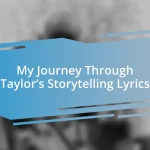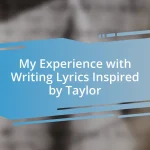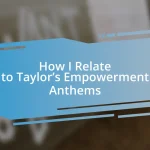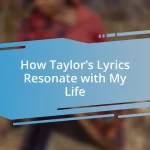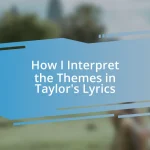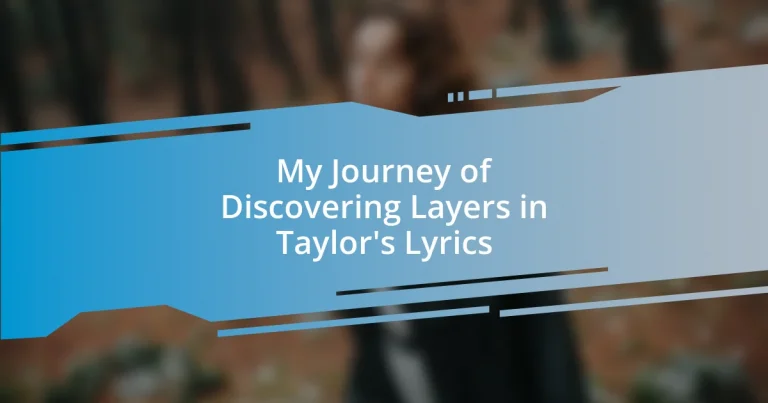Key takeaways:
- Taylor Swift’s lyrics blend personal experience, storytelling, and vivid imagery, allowing listeners to connect emotionally through relatable themes such as love, loss, and self-discovery.
- Her use of metaphors and cultural references enhances the depth of her songs, transforming simple phrases into profound reflections on life’s complexities and societal values.
- The authenticity in her storytelling invites listeners to reflect on their own experiences, fostering a sense of connection and understanding through shared emotions and narratives.
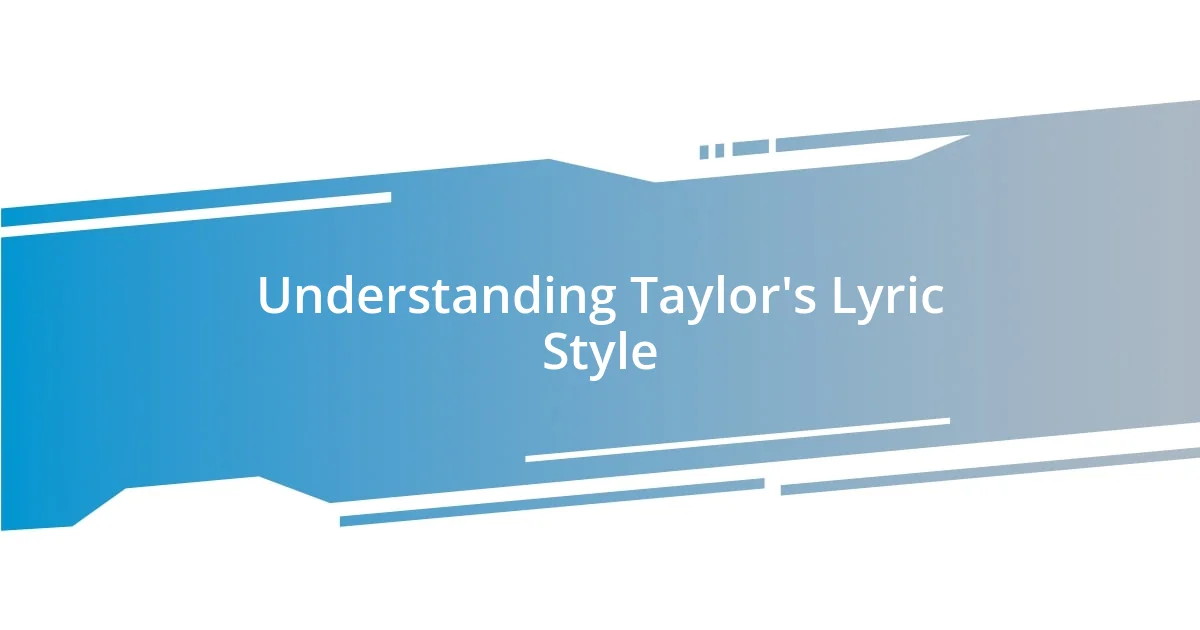
Understanding Taylor’s Lyric Style
Taylor Swift’s lyric style is a fascinating tapestry woven from personal experience, storytelling, and vivid imagery. I remember the first time I heard “All Too Well”; it felt like unlocking a hidden memory. How does she capture such raw emotions and moments so precisely? I often find myself replaying her lyrics, trying to decipher the layers and nuances she embeds in each line.
What strikes me most is her ability to evoke feelings through specific details, allowing listeners to see, feel, and live each story alongside her. Take “The Archer,” for instance. The line about grappling with insecurities hits home, resonating deeply with anyone who has faced their own demons. I often ask myself: how does she make the personal feel so universal?
Moreover, her use of metaphor and symbolism transforms seemingly simple phrases into profound statements about love, loss, and self-discovery. In songs like “Blank Space,” I appreciate how she plays with the trope of the ‘crazy ex-girlfriend’ while simultaneously subverting it. This duality invites listeners to reconsider their preconceptions and see the deeper truths lurking below the surface. Don’t you sometimes wonder how one artist can articulate such a wide array of human experiences so eloquently?

Analyzing Themes in Taylor’s Songs
When I dive into Taylor’s songs, I can’t help but notice the recurring theme of heartbreak. It feels so relatable; I remember my own moments of sorrow when I first heard “Back to December.” The way she captures the regret and longing feels like she’s narrating a chapter of my life. Each track tells a story, drawing listeners into the elaborate emotional landscape she crafts.
- Love and Loss: From buildup to heartbreak, she captures the spectrum of romantic experiences.
- Self-Discovery: Songs like “Clean” explore reclamation of identity post-heartbreak, which resonates with many.
- Empowerment: Tracks like “Shake It Off” highlight resilience and the importance of shaking off negativity.
- Isolation: In “The Archer,” the feeling of being trapped within oneself evokes memories of my own struggles with insecurity.
It’s this blend of personal truth and storytelling that makes her work feel both intimate and expansive. When I hear her sing about friendship in “It’s Nice to Have a Friend,” it evokes this warmth and nostalgia for my own connections. Taylor’s lyrics often remind me of the power we all have to embrace our vulnerabilities and share our experiences with others.
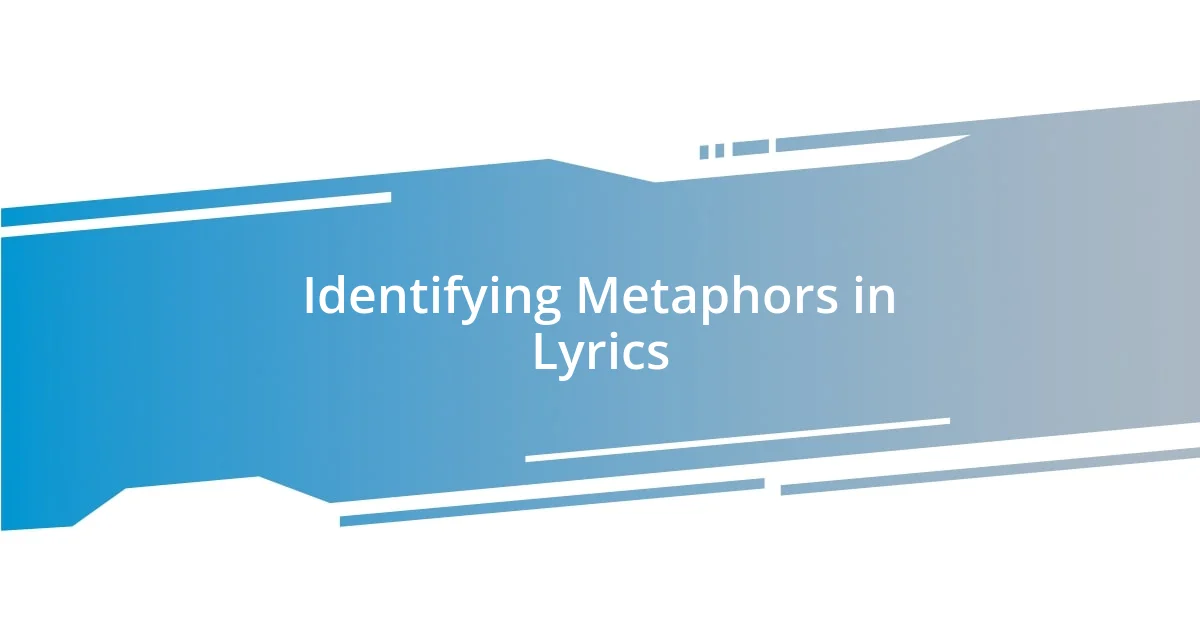
Identifying Metaphors in Lyrics
Identifying metaphors in Taylor Swift’s lyrics is like uncovering hidden gems within each song. Take the metaphor of a glass castle in “Call It What You Want.” It represents fragility and the façade of perfection, which resonates deeply, especially during times of vulnerability. Personally, I remember listening to this track after a tough period; the imagery struck me because it felt like she was articulating a truth that I had felt but couldn’t express.
In her song “All Too Well,” she uses metaphors like “the door slams” to invoke the finality of a relationship. The vividness of that imagery brought me back to my own experiences of heartbreak, reminding me of moments when everything felt like it changed in an instant. It’s fascinating how such simple phrases can evoke powerful emotional imagery, almost like snapshots of a more complex reality.
Metaphors in Taylor’s work often reflect life’s complexities, making her lyrics deeply relatable. When I listen to “The Way I Loved You,” the metaphor of a ‘storm’ beautifully encapsulates the chaos of passionate love. I can recall feeling caught in my own emotional whirlwind, where the excitement felt both exhilarating and overwhelming. That’s the beauty of her metaphors; they manage to articulate sentiments that many of us struggle to put into words.
| Song | Metaphor |
|---|---|
| Call It What You Want | Glass castle representing fragility and the façade of perfection |
| All Too Well | Door slams symbolizing the finality of a relationship |
| The Way I Loved You | Storm capturing the chaos of passionate love |
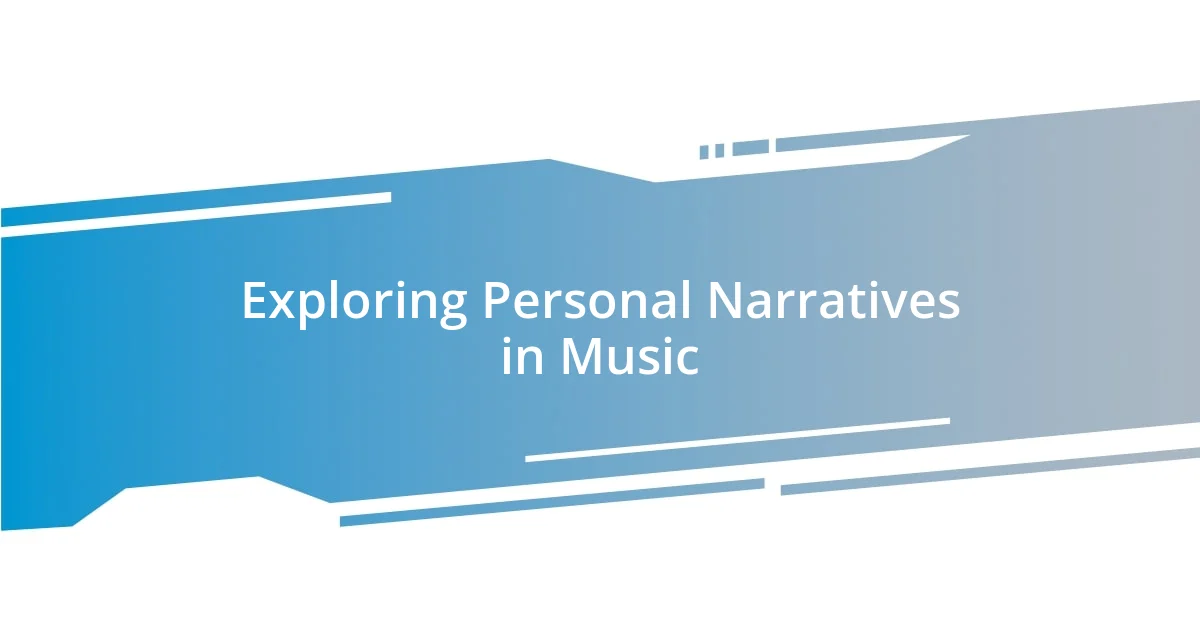
Exploring Personal Narratives in Music
Exploring personal narratives in music can be a profound way to connect with our own experiences. When I listen to “The Story of Us,” I can’t help but reflect on my own moments of miscommunication. The way Taylor portrays the tension between two people feels like a window into my past relationships, making me think: how often do we misunderstand each other? It strikes a chord, reminding me that in those moments of silence, emotions can speak louder than words.
The authenticity in her storytelling makes it easy for listeners to see themselves in her lyrics. Take “The Best Day,” for instance; it brings back a flood of memories with my family. I distinctly remember driving home with my mom, belting out that song together. It’s like the lyrics create a special bond, allowing me to relive those cherished moments while navigating through life’s ups and downs. It’s incredible how music can serve as a bridge to our past.
What I find so engaging about her music is its ability to blend personal anecdotes with universal themes. In “This Love,” the imagery of a relationship that goes through cycles resonates with my experiences of love that felt both lost and found. It makes me wonder: how many of us have had love that ebbed and flowed, only to return stronger? It’s in these moments that Taylor’s music truly shines, providing a soundscape that mirrors the complexities of our lives.
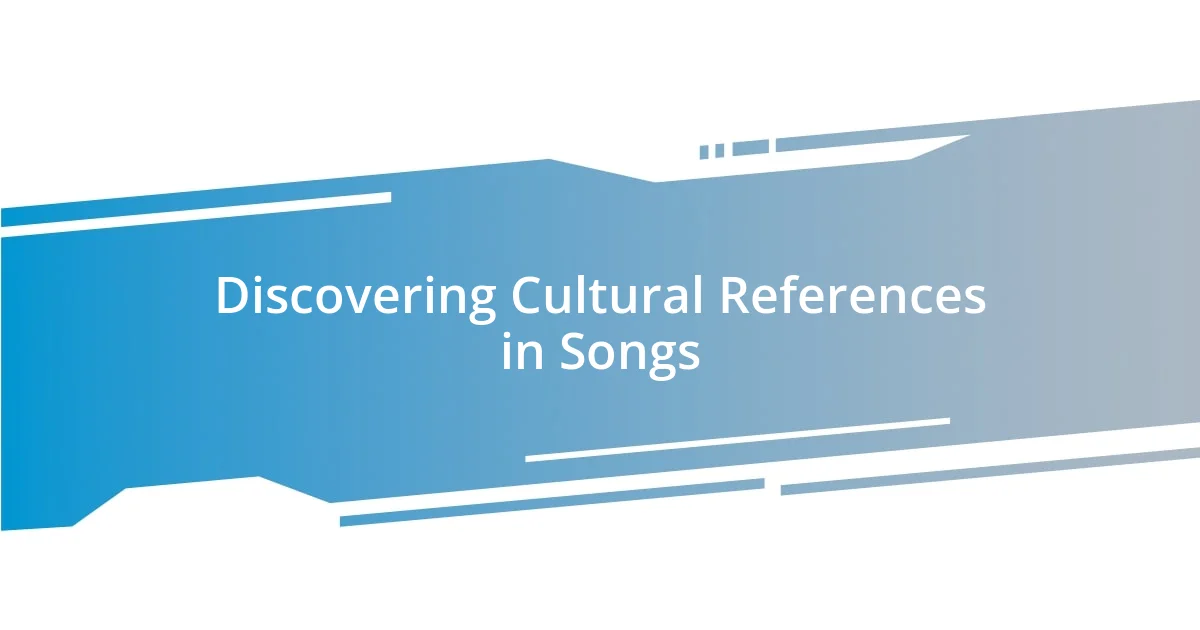
Discovering Cultural References in Songs
Listening to songs often feels like stepping into a cultural dialogue. Take, for example, Taylor’s references to iconic figures or events in her lyrics. In “You Belong with Me,” the imagery of the football game and the girl-next-door archetype takes me back to high school, where social dynamics shaped so much of who we wanted to be. It makes me reflect: how do our surroundings and cultural touchstones influence our identities today?
What I find particularly fascinating is how Taylor weaves cultural references into her songs to create a shared experience. In “Blank Space,” her portrayal of romantic relationships playing out like a viral news story highlights the interplay between media and personal authenticity. I can’t help but think back to how social media shaped my own relationships, making me wonder: do we curate our love lives for the audience more than for ourselves?
Cultural references in music serve as lenses through which we can interpret experiences. When Taylor mentions classic literature or pop culture, it not only enriches her storytelling but also creates an immediate connection with listeners. For instance, her nod to cinematic tropes in “Wildest Dreams” evokes this cinematic romance that many of us fantasize about. It makes me recall binge-watching romantic films in my youth and daydreaming about what love could be. How much have these cultural narratives shaped our ideas of love and success? It’s thought-provoking to realize that the songs we cherish can also be mirrors reflecting societal values.

Connecting Lyrics to Personal Experiences
I often find that the lyrics in Taylor’s songs resonate deeply with my own life experiences, almost as if she’s singing my thoughts back to me. For instance, in “All Too Well,” the vivid imagery of nostalgia and heartache transports me to a specific moment in my past. I vividly remember walking through the rain after a heartbreak, feeling lost in my thoughts while the scene around me matched the melancholy tone of the song. It makes me wonder: how does music have the power to articulate emotions we often struggle to express ourselves?
The raw vulnerability in her storytelling allows me to reflect on my own struggles with identity and belonging. When I hear “Shake It Off,” I can’t help but think about the times I felt pressured to conform to others’ expectations. I recall a moment in high school when I finally decided to ditch the crowd and embrace my quirky side – a choice that felt exhilarating yet terrifying. Her lyrics remind me that authenticity can be a liberating choice, sparking the question: when do we offer ourselves permission to truly be who we are?
I believe that connecting with Taylor’s lyrics invites us to examine our life’s turning points. Listening to “Clean,” I remember the relief that came after overcoming a difficult chapter. It resonates with my own journey of healing from a tumultuous period, where every step felt both painful and enlightening. This song encourages me to embrace the notion that growth often emerges from struggle, prompting me to ask: what personal battles have led to my own transformation?
